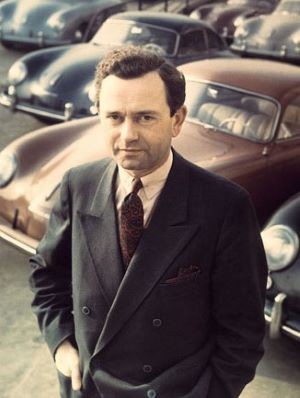
Ferdinand (Ferry) Anton Ernst Porsche (1909–1998), the second child of Ferdinand and Aloisia Porsche, was born on 19 September 1909 in Wiener Neustadt. His sister Louise (1904-1999) was already five years of age. At the time of his birth, his father was employed as a Technical Manager at Austro-Daimler in Wiener Neustadt.
Ferry Porsche was one of the first employees to work in his father’s design engineering office, which he founded in Stuttgart in 1931. Beforehand, Ferry Porsche completed a one-year industrial placement at the Bosch company in Stuttgart after finishing school. In a further year at the firm, he received theoretical, intensive, and private instruction in automotive engineering. As early as 1932, Ferry Porsche was assigned certain responsibilities, namely, test control, the coordination of design engineers and the maintenance of good client relationships (e.g. with Auto Union in Zwickau). When Dr. Ing. h.c. F. Porsche GmbH was commissioned by the Imperial Federation of the Automobile Industry (Reichsverband der Automobilindustrie (RDA)) in 1934 to build a Volkswagen (Porsche model 60), Ferry Porsche was placed in charge of the test drives very soon afterwards. Seeing as more and more of his father’s time was being taken up with concerns relating to the establishment of the Volkswagen plant in Wolfsburg, Ferry Porsche was appointed Deputy Manager of the entire business, which was located in Stuttgart-Zuffenhausen since 1938. Because of the increasing threat of air attacks on Stuttgart, Ferry Porsche oversaw the relocation of essential divisions of the design engineering office to Gmünd/Carinthia. The headquarters and Ferry Porsche, himself, remained in Stuttgart.
Following several month’s imprisonment by the Americans and the French and internment, Ferry Porsche returned in July 1946 to Gmünd/Carinthia, the sole location of the company since the end of the war, and took over management of the business because his father was still in French captivity. The realization of his concept of a small sports car based on the Volkswagen in collaboration with the head design engineer Karl Rabe (1895-1968) and the body design engineer Erwin Komenda (1904-1966), 17 years after his father had founded the business, constituted a new departure for the company, which, hitherto, had been a pure design engineering office and was now also to become a production company.
Thanks to the Porsche model 356, Ferry Porsche founded the company’s global reputation as a producer of successful sports and racing cars in 1948. In doing so, he used the same design principles that his father applied with the Volkswagen (air-cooled horizontally opposed engine in rear), and, at the same time, upheld the racing tradition that his father started in 1900 at the beginning of his career as a design engineer. 52 units of the Porsche model 356 were manually built at Gmünd.
In 1949, Ferry Porsche returned with the company to Stuttgart-Zuffenhausen in his capacity as General Manager. However, the former premises were still occupied by the Americans. Consequently, the first Porsche 356 was produced under makeshift conditions in the rented rooms of the car body company Reutter in spring 1950. Prior to this, Ferry Porsche concluded a forward-looking contract with Heinz Nordhoff (1899-1968), the General Manager of Volkswagen. The contract stipulated that the Volkswagen plant would supply the parts required for the sports car series. Furthermore, it set forth that the cars produced by the company would be sold via the sales network of the VW plant and be serviced by its service organisation. The Porsche company undertook to advise the Volkswagen factory on activities relating to design engineering.
Ferry Porsche achieved a second major triumph by concluding contracts with VW wholesalers, which meant a more stable financial situation for the company’s future development.
When his father died in January 1951, Ferry Porsche had assumed sole responsibility of the company and, as General Manager, oversaw its transformation from a limited partnership to a public limited company (plc) in 1972. Although the nominal capital of the plc was increased in 1984, the Porsche and Piëch families are still the sole proprietors of the ordinary shares.
Later, as Chairman of the Supervisory Board, Ferry Porsche continued to determine the spirit of the Porsche company, on which he had a formative influence. This was characterised by its sporty tradition which, on the one hand, was mirrored by the deployment of already-built cars in sports competitions and, on the other hand, was instilled by the construction of future models. In 1990, Ferry Porsche resigned as Chairman of the Supervisory Board, but was Honorary Chairman until his death.
Ferry Porsche died on 27 March 1998 in Zell am See, Austria, and was buried beside his parents and his wife Dorothea in the “Schüttgut” chapel there..
He received numerous tributes and awards for his commitment to new developments in the automotive industry. The Technical University of Vienna awarded him an Honorary Doctorate in 1965 and, in 1984, the federal state of Baden-Wuerttemburg bestowed on him the title of Honorary Professor. He was also awarded, inter alia, the “Großen Goldenen Ehrenzeichen” of the Republic of Austria (1975), the “Großen Bundesverdienstkreuz mit Stern” of the Federal Republic of Germany in 1979 (the highest possible decoration for service), the “Citizen’s Medal” of the city of Stuttgart (1989) and the “Freedom of the City” of Zell am See (1981) and Wiener Neustadt (1994).

You must be logged in to post a comment.